 Tìm kiếm
Tìm kiếm
Chương 1 Luật nuôi con nuôi 2010: Những quy định chung
| Số hiệu: | 52/2010/QH12 | Loại văn bản: | Luật |
| Nơi ban hành: | Quốc hội | Người ký: | Nguyễn Phú Trọng |
| Ngày ban hành: | 17/06/2010 | Ngày hiệu lực: | 01/01/2011 |
| Ngày công báo: | 23/09/2010 | Số công báo: | Từ số 562 đến số 563 |
| Lĩnh vực: | Quyền dân sự | Tình trạng: | Còn hiệu lực |
TÓM TẮT VĂN BẢN
Văn bản tiếng việt
Văn bản tiếng anh
Luật này quy định nguyên tắc, điều kiện nuôi con nuôi; thẩm quyền, trình tự, thủ tục giải quyết việc nuôi con nuôi; quyền, nghĩa vụ của cha mẹ nuôi, con nuôi và cha mẹ đẻ; trách nhiệm của cơ quan, tổ chức trong việc nuôi con nuôi.
Việc nuôi con nuôi nhằm xác lập quan hệ cha, mẹ và con lâu dài, bền vững, vì lợi ích tốt nhất của người được nhận làm con nuôi, bảo đảm cho con nuôi được nuôi dưỡng, chăm sóc, giáo dục trong môi trường gia đình.
Trong Luật này, những từ ngữ dưới đây được hiểu như sau:
1. Nuôi con nuôi là việc xác lập quan hệ cha, mẹ và con giữa người nhận con nuôi và người được nhận làm con nuôi.
2. Cha mẹ nuôi là người nhận con nuôi sau khi việc nuôi con nuôi được cơ quan nhà nước có thẩm quyền đăng ký.
3. Con nuôi là người được nhận làm con nuôi sau khi việc nuôi con nuôi được cơ quan nhà nước có thẩm quyền đăng ký.
4. Nuôi con nuôi trong nước là việc nuôi con nuôi giữa công dân Việt Nam với nhau thường trú ở Việt Nam.
5. Nuôi con nuôi có yếu tố nước ngoài là việc nuôi con nuôi giữa công dân Việt Nam với người nước ngoài, giữa người nước ngoài với nhau thường trú ở Việt Nam, giữa công dân Việt Nam với nhau mà một bên định cư ở nước ngoài.
6. Trẻ em mồ côi là trẻ em mà cả cha mẹ đẻ đã chết hoặc một trong hai người đã chết và người kia không xác định được.
7. Trẻ em bị bỏ rơi là trẻ em không xác định được cha mẹ đẻ.
8. Gia đình gốc là gia đình của những người có quan hệ huyết thống.
9. Gia đình thay thế là gia đình nhận trẻ em làm con nuôi.
10. Cơ sở nuôi dưỡng là cơ sở bảo trợ xã hội, cơ sở trợ giúp trẻ em, cơ sở khác được thành lập theo pháp luật Việt Nam để nuôi dưỡng, chăm sóc, giáo dục trẻ em.
1. Khi giải quyết việc nuôi con nuôi, cần tôn trọng quyền của trẻ em được sống trong môi trường gia đình gốc.
2. Việc nuôi con nuôi phải bảo đảm quyền, lợi ích hợp pháp của người được nhận làm con nuôi và người nhận con nuôi, tự nguyện, bình đẳng, không phân biệt nam nữ, không trái pháp luật và đạo đức xã hội.
3. Chỉ cho làm con nuôi người ở nước ngoài khi không thể tìm được gia đình thay thế ở trong nước.
1. Thứ tự ưu tiên lựa chọn gia đình thay thế được thực hiện quy định sau đây:
a) Cha dượng, mẹ kế, cô, cậu, dì, chú, bác ruột của người được nhận làm con nuôi;
b) Công dân Việt Nam thường trú ở trong nước;
c) Người nước ngoài thường trú ở Việt Nam;
d) Công dân Việt Nam định cư ở nước ngoài;
đ) Người nước ngoài thường trú ở nước ngoài.
2. Trường hợp có nhiều người cùng hàng ưu tiên xin nhận một người làm con nuôi thì xem xét, giải quyết cho người có điều kiện nuôi dưỡng, chăm sóc, giáo dục con nuôi tốt nhất.
Nhà nước bảo hộ quyền nuôi con nuôi và quyền được nhận làm con nuôi theo quy định của Luật này và các quy định khác của pháp luật có liên quan.
Nhà nước khuyến khích tổ chức, cá nhân hỗ trợ nhân đạo cho việc nuôi dưỡng, chăm sóc, giáo dục trẻ em có hoàn cảnh đặc biệt. Việc hỗ trợ nhân đạo không được ảnh hưởng đến việc cho nhận con nuôi.
Chính phủ quy định việc tiếp nhận, quản lý, sử dụng hỗ trợ nhân đạo quy định tại điều này.
1. Trẻ em dưới 16 tuổi
2. Người từ đủ 16 tuổi đến dưới 18 tuổi nếu thuộc một trong các trường hợp sau đây:
a) Được cha dượng, mẹ kế nhận làm con nuôi;
b) Được cô, cậu, dì, chú, bác ruột nhận làm con nuôi.
3. Một người chỉ được làm con nuôi của một người độc thân hoặc của cả hai người là vợ chồng.
4. Nhà nước khuyến khích việc nhận trẻ em mồ côi, trẻ em bị bỏ rơi, trẻ em có hoàn cảnh đặc biệt khác làm con nuôi.
1. Ủy ban nhân dân xã, phường, thị trấn (sau đây gọi chung là Ủy ban nhân dân cấp xã) nơi thường trú của người được giới thiệu làm con nuôi hoặc của người nhận con nuôi đăng ký việc nuôi con nuôi trong nước.
2. Ủy ban nhân dân tỉnh, thành phố trực thuộc trung ương (sau đây gọi chung là Ủy ban nhân dân cấp tỉnh) nơi thường trú của người được giới thiệu làm con nuôi quyết định việc nuôi con nuôi có yếu tố nước ngoài; Sở Tư pháp tỉnh, thành phố trực thuộc trung ương đăng ký việc nuôi con nuôi có yếu tố nước ngoài.
3. Cơ quan đại diện nước Cộng hòa xã hội chủ nghĩa Việt Nam ở nước ngoài đăng ký việc nuôi con nuôi của công dân Việt Nam tạm trú ở nước ngoài.
Tòa án nhân dân có thẩm quyền giải quyết yêu cầu chấm dứt việc nuôi con nuôi theo quy định của pháp luật về tố tụng dân sự.
1. Con nuôi có quyền được biết về nguồn gốc của mình. Không ai được cản trở con nuôi được biết về nguồn gốc của mình.
2. Nhà nước khuyến khích, tạo điều kiện cho con nuôi là người Việt Nam ở nước ngoài về thăm quê hương, đất nước.
1. Người nhận con nuôi phải nộp lệ phí đăng ký nuôi con nuôi.
2. Ngoài lệ phí đăng ký nuôi con nuôi quy định tại khoản 1 điều này, người nước ngoài không thường trú ở Việt Nam nhận con nuôi ở Việt Nam phải trả một khoản tiền để bù đắp một phần chi phí giải quyết nuôi con nuôi nước ngoài, bao gồm chi phí nuôi dưỡng, chăm sóc, giáo dục trẻ em từ khi được giới thiệu làm con nuôi đến khi hoàn thành thủ tục giao nhận con nuôi, xác minh nguồn gốc của người được giới thiệu làm con nuôi, giao nhận con nuôi và thù lao hợp lý cho nhân viên của cơ sở nuôi dưỡng.
3. Chính phủ quy định chi tiết thẩm quyền thu, mức thu, việc miễn, giảm, chế độ quản lý, sử dụng lệ phí đăng ký nuôi con nuôi, chi phí giải quyết nuôi con nuôi nước ngoài quy định tại khoản 1 và khoản 2 điều này.
4. Ngoài lệ phí đăng ký nuôi con nuôi, chi phí giải quyết nuôi con nuôi nước ngoài quy định tại khoản 1 và khoản 2 điều này, tổ chức, cá nhân có hoạt động liên quan đến nuôi con nuôi nước ngoài không được đặt ra bất kỳ khoản thu nào khác.
1. Lợi dụng việc nuôi con nuôi để trục lợi, bóc lột sức lao động, xâm hại tình dục; bắt cóc, mua bán trẻ em.
2. Giả mạo giấy tờ để giải quyết việc nuôi con nuôi.
3. Phân biệt đối xử giữa con đẻ và con nuôi.
4. Lợi dụng việc cho con nuôi để vi phạm pháp luật về dân số.
5. Lợi dụng việc làm con nuôi của thương binh, người có công với cách mạng, người thuộc dân tộc thiểu số để hưởng chế độ, chính sách ưu đãi của Nhà nước.
6. Ông, bà nhận cháu làm con nuôi hoặc anh, chị, em nhận nhau làm con nuôi.
7. Lợi dụng việc nuôi con nuôi để vi phạm pháp luật, phong tục tập quán, đạo đức, truyền thống văn hóa tốt đẹp của dân tộc.
Article 1. Scope of regulation
This Law provides the principles and conditions for adoption; competence, order and procedures for settling adoptions; rights and obligations of adoptive parents, adopted children and natural parents; and responsibilities of agencies and organizations in adoption.
Article 2. Purposes of adoption
Adoption aims to establish permanent parent and child relationships in the best interests of adopted persons, ensuring that adopted persons are nurtured, cared for and educated in the family environment.
Article 3. Interpretation of terms
In this Law. the terms below are construed as follows:
1. Adoption means the establishment of parent and child relationships between the adopting and adopted persons.
2. Adoptive parent means the person who adopts another after the adoption is registered by a competent state agency.
3. Adopted person means the person who is adopted after the adoption is registered by a competent state agency.
4. Domestic adoption means the adoption between Vietnamese citizens permanently residing in Vietnam.
5. Intercountry adoption means the adoption between a Vietnamese citizen and a foreigner, between foreigners permanently residing in Vietnam, and between Vietnamese citizens either of whom settles abroad.
6. Orphan means a child whose parents are dead or whose parent is dead while the other is unidentifiable.
7. Abandoned child means a child whose natural parents are unidentifiable.
8. Family of origin means the family of persons who have biological ties.
9. Substitute family means the family that adopts a child.
10. Nurturing center means a social relief establishment, a child support establishment or another establishment established under Vietnamese law to nurture, care for and educate children.
Article 4. Principles of settlement of adoptions
1. When settling adoptions, the right of children to live in the family of origin must be respected.
2. Adoption must ensure the legitimate rights and interests of adopted and adopting persons, free consent, equality, non-discrimination between male and female and non-violation of law and social ethics.
3. Adoption by a person living abroad is allowed only when no domestic substitute family can be found.
Article 5. Order of priority in the selection of substitute families
1. The order of priority in the selection of substitute families is as follows:
a/ Step father, step mother, natural aunt or uncle of the adopted person;
b/ Vietnamese citizens permanently residing in the country;
c/ Foreigners permanently residing in Vietnam;
d/ Vietnamese citizens settling abroad;
e/ Foreigners permanently residing abroad.
2. In case more than one person of the same priority rank seek to adopt a person, adoption shall be considered and settled for the person with the best nurturing, care and education conditions.
Article 6. Protection of the right to adopt and the right to be adopted
The State protects the right to adopt and the right to be adopted in accordance with this Law and relevant laws.
Article 7. Encouragement of humanitarian assistance for the care for children in disadvantaged circumstances
The State encourages organizations and individuals to provide humanitarian assistance for the nurture, care for and education of children in disadvantaged circumstances. Humanitarian assistance must not affect adoption.
The Government shall stipulate the receipt, management and use of humanitarian assistance referred to in this Article.
Article 8. Persons allowed to be adopted
1. Children under 16 years.
2. Persons aged between full 16 years and under 18 years falling into either of the following cases:
a/ To be adopted by the step father or step mother;
b/ To be adopted by a natural aunt or uncle.
3. A person may be adopted by only one single
person or two persons being husband and wife.
4. The State encourages adoption of orphans, abandoned children and children in other disadvantaged circumstances.
Article 9. Competence to register adoptions
1. People's Committees of communes, wards or townships (below collectively referred to as commune-level People's Committees) in which the persons introduced for adoption or adopting persons permanently reside are competent to register domestic adoptions.
2. People's Committees of provinces or centrally run cities (below collectively referred to as provincial-level People's Committees) in which the persons introduced for adoption permanently reside are competent to decide on intercountry adoptions: provincial-level Justice Departments are competent to register intercountry adoptions.
3. Overseas representative missions of the Socialist Republic of Vietnam are competent to register adoptions by Vietnamese citizens temporarily residing abroad.
Article 10. Competence to settle requests for termination of adoption
People's Courts are competent to settle requests for termination of adoption in accordance with the law on civil procedures.
Article 11. Assurance of the right to know one's origin
1. Adopted persons have the right to know their origin. Nobody is allowed to obstruct an adopted person from knowing his/her origin.
2. The State encourages and creates conditions for adopted persons being Vietnamese living abroad to visit their native places.
Article 12. Fee for adoption registration, expenses for settlement of intercountry adoptions
1. Adopting persons shall pay an adoption registration fee.
2. In addition to the adoption registration fee referred to in Clause 1 of this Article, a foreigner not permanently residing in Vietnam and seek to adopt a child in Vietnam shall pay a sum of money to partly offset expenses for settling intercountry adoptions, including expenses for nurturing, caring for and educating the child from the time of introduction for adoption to the time of completion of procedures for the child's delivery and receipt, verifying the origin of the introduced child, delivering and receiving the child and reasonable remuneration for the nurturing center's employees.
3. The Government shall specify the competence to collect the adoption registration fee. its rates and its exemption and reduction, management and use, and expenses for settling intercountry adoptions under Clauses 1 and 2 of this Article.
4. In addition to the adoption registration fee and expenses for settling intercountry adoptions referred to in Clauses 1 and 2 of this Article, organizations and individuals engaged in intercountry adoption activities may not impose any other charges.
1. Taking advantage of adoption for self-seeking purposes, exploiting the working capacity, sexually abusing, abducting or trafficking in children.
2. Forging papers for adoption settlement.
3. Discriminating between natural and adopted children.
4. Taking advantage of adoption to violate the population law.
5. Abusing the adoption by war invalids, persons with meritorious services to the revolution or ethnic minority persons to enjoy state incentives.
6. Grandparents adopting their grandchildren or siblings adopting one another.
7. Taking advantage of adoption to act against the law or fine national customs, practices, ethics or cultural traditions.
Văn bản liên quan
Cập nhật
Điều 7. Khuyến khích hỗ trợ nhân đạo cho việc chăm sóc trẻ em có hoàn cảnh đặc biệt
Điều 9. Thẩm quyền đăng ký nuôi con nuôi
Điều 15. Trách nhiệm tìm gia đình thay thế cho trẻ em
Điều 22. Đăng ký việc nuôi con nuôi
Điều 28. Các trường hợp nuôi con nuôi có yếu tố nước ngoài
Điều 31. Hồ sơ của người nhận con nuôi
Điều 32. Hồ sơ của người được giới thiệu làm con nuôi nước ngoài
Điều 36. Trình tự giới thiệu trẻ em làm con nuôi
Điều 40. Công dân Việt Nam ở trong nước nhận trẻ em nước ngoài làm con nuôi
Điều 7. Khuyến khích hỗ trợ nhân đạo cho việc chăm sóc trẻ em có hoàn cảnh đặc biệt
Điều 9. Thẩm quyền đăng ký nuôi con nuôi
Điều 12. Lệ phí đăng ký nuôi con nuôi, chi phí giải quyết nuôi con nuôi nước ngoài
Điều 15. Trách nhiệm tìm gia đình thay thế cho trẻ em
Điều 17. Hồ sơ của người nhận con nuôi
Điều 20. Kiểm tra hồ sơ, lấy ý kiến của những người liên quan
Điều 21. Sự đồng ý cho làm con nuôi
Điều 22. Đăng ký việc nuôi con nuôi
Điều 28. Các trường hợp nuôi con nuôi có yếu tố nước ngoài
Điều 30. Hợp pháp hóa lãnh sự giấy tờ, tài liệu
Điều 31. Hồ sơ của người nhận con nuôi
Điều 32. Hồ sơ của người được giới thiệu làm con nuôi nước ngoài
Điều 34. Trách nhiệm kiểm tra và chuyển hồ sơ của người nhận con nuôi
Điều 35. Căn cứ để giới thiệu trẻ em làm con nuôi
Điều 36. Trình tự giới thiệu trẻ em làm con nuôi
Điều 40. Công dân Việt Nam ở trong nước nhận trẻ em nước ngoài làm con nuôi
Điều 42. Nuôi con nuôi ở khu vực biên giới
Bài viết liên quan
Nhận nuôi trẻ mồ côi có mất tiền không mới nhất 2025?
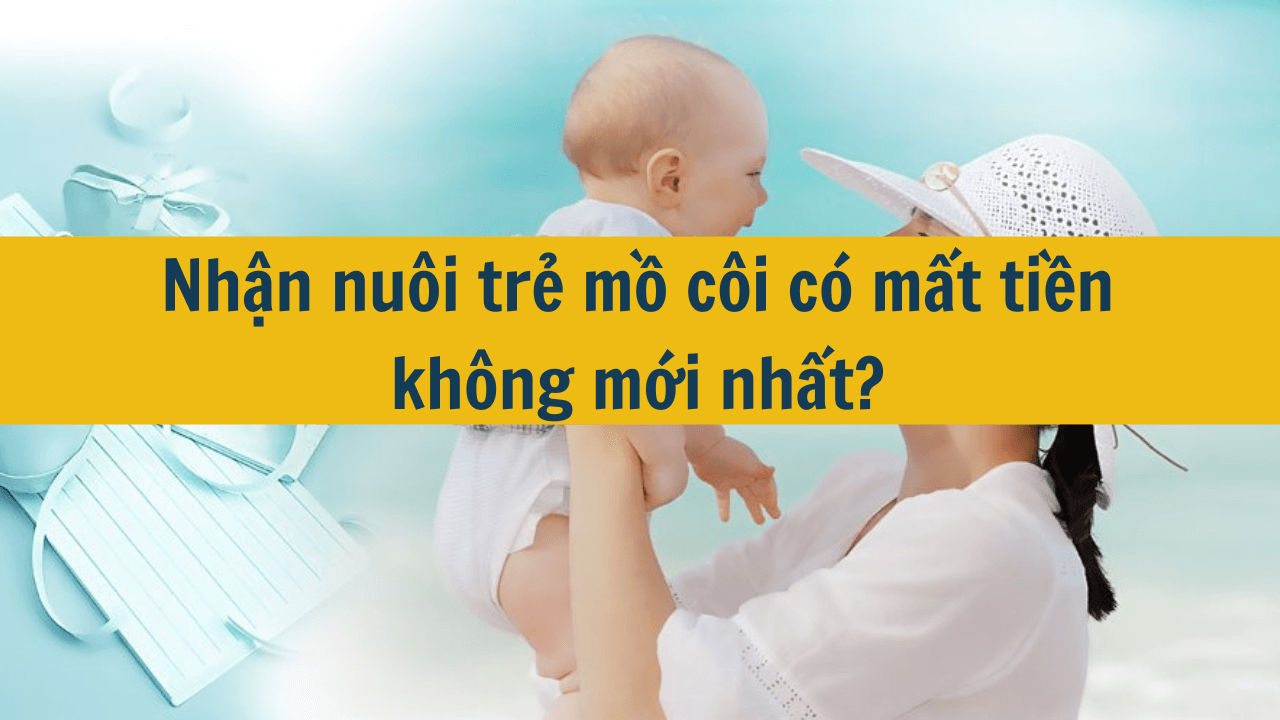
Nhận nuôi trẻ mồ côi có mất tiền không mới nhất 2025?
Việc nhận nuôi trẻ mồ côi là một hành động nhân văn, mang lại cơ hội cho trẻ em không nơi nương tựa được sống trong môi trường gia đình yêu thương và chăm sóc. Tuy nhiên, nhiều người vẫn thắc mắc về các chi phí liên quan đến thủ tục nhận nuôi, liệu có phải trả tiền khi nhận nuôi một trẻ em mồ côi hay không. Theo quy định mới nhất năm 2025, việc nhận nuôi trẻ mồ côi không yêu cầu phải trả một khoản tiền nào cho quá trình này, nhưng vẫn có những chi phí phát sinh trong quá trình làm thủ tục pháp lý. Bài viết dưới đây sẽ cung cấp thông tin chi tiết về các khoản chi phí và các quy định liên quan đến việc nhận nuôi trẻ mồ côi trong năm 2025. 28/12/2024Thời hạn giải quyết hồ sơ nhận nuôi con nuôi ở trại trẻ mô côi bao nhiêu lâu mới nhất 2025?
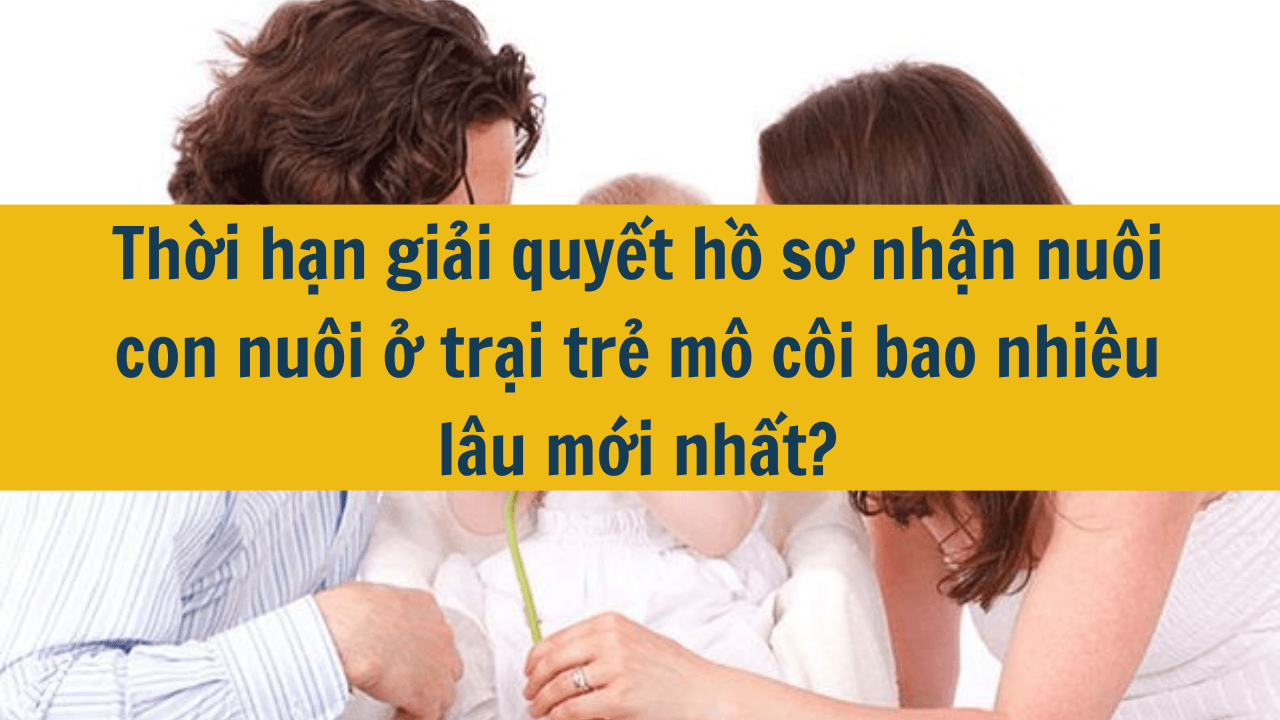
Thời hạn giải quyết hồ sơ nhận nuôi con nuôi ở trại trẻ mô côi bao nhiêu lâu mới nhất 2025?
Việc nhận nuôi con nuôi tại các trại trẻ mồ côi là một quy trình phức tạp, yêu cầu thời gian để đảm bảo rằng mọi bước đều được thực hiện đúng pháp luật và bảo vệ quyền lợi của trẻ em. Một trong những vấn đề quan trọng mà các cá nhân, gia đình quan tâm khi thực hiện thủ tục nhận nuôi là thời gian giải quyết hồ sơ. Theo các quy định pháp lý mới nhất trong năm 2025, thời gian giải quyết hồ sơ nhận nuôi con nuôi ở các trại trẻ mồ côi có thể thay đổi tùy theo từng trường hợp cụ thể. Bài viết này sẽ cung cấp thông tin chi tiết về thời gian giải quyết hồ sơ nhận nuôi con nuôi và các yếu tố ảnh hưởng đến quá trình này. 27/12/2024Điều kiện nhận nuôi con nuôi ở trại trẻ mồ côi được quy định thế nào mới nhất 2025?
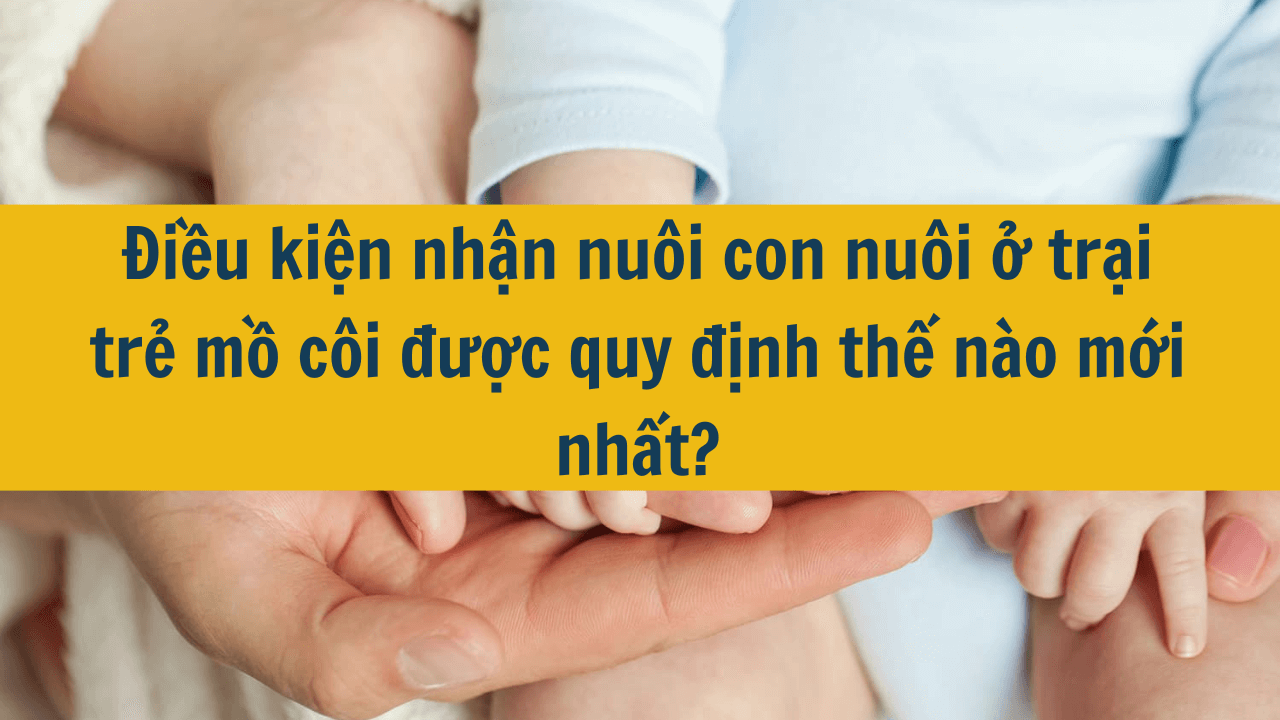
Điều kiện nhận nuôi con nuôi ở trại trẻ mồ côi được quy định thế nào mới nhất 2025?
Nhận nuôi con nuôi tại các trại trẻ mồ côi không chỉ là một hành động mang tính nhân văn, mà còn là một quy trình pháp lý nghiêm ngặt nhằm bảo vệ quyền lợi của trẻ em và gia đình nhận nuôi. Để có thể thực hiện việc nhận nuôi một trẻ em tại các cơ sở nuôi dưỡng này, các cá nhân hoặc gia đình cần đáp ứng một số điều kiện pháp lý cụ thể theo quy định của pháp luật Việt Nam. Những điều kiện này được thiết kế nhằm đảm bảo rằng việc nhận nuôi sẽ mang lại một môi trường sống ổn định và phát triển cho trẻ em. Bài viết này sẽ cung cấp thông tin chi tiết về các điều kiện nhận nuôi con nuôi ở trại trẻ mồ côi mới nhất năm 2025, giúp các bậc phụ huynh và cá nhân quan tâm hiểu rõ quy trình và các yêu cầu cần thiết. 27/12/2024Thủ tục nhận nuôi con nuôi ở trại trẻ mồ côi được thực hiện thế nào mới nhất 2025?

Thủ tục nhận nuôi con nuôi ở trại trẻ mồ côi được thực hiện thế nào mới nhất 2025?
Việc nhận nuôi con nuôi tại các trại trẻ mồ côi là một trong những phương thức giúp trẻ em có hoàn cảnh khó khăn được bảo vệ và phát triển trong một gia đình mới. Tuy nhiên, thủ tục nhận nuôi con nuôi tại các trại trẻ mồ côi không phải là một quy trình đơn giản, mà cần tuân theo các quy định pháp lý nghiêm ngặt để bảo đảm quyền lợi của trẻ em và gia đình nhận nuôi. Trong năm 2025, pháp luật Việt Nam tiếp tục điều chỉnh và hoàn thiện các quy trình này để đảm bảo tính hợp pháp, minh bạch và nhân đạo. Bài viết này sẽ giải thích chi tiết về các bước thủ tục nhận nuôi con nuôi tại trại trẻ mồ côi, cũng như những điều kiện mà các cá nhân, gia đình cần đáp ứng để có thể thực hiện việc nhận nuôi một cách hợp pháp. 27/12/2024Thủ tục nhận nuôi con nuôi trong nước mới nhất 2025

Thủ tục nhận nuôi con nuôi trong nước mới nhất 2025
Nhận con nuôi là một quyết định đầy ý nghĩa, giúp trẻ em có cơ hội được sống trong một gia đình đầy đủ yêu thương và chăm sóc. Tuy nhiên, để thực hiện thủ tục nhận nuôi con nuôi theo đúng quy định pháp luật, các bậc phụ huynh cần phải tuân thủ những quy trình và yêu cầu nghiêm ngặt. Bài viết này sẽ cung cấp thông tin chi tiết về thủ tục nhận nuôi con nuôi trong nước mới nhất 2025, từ việc chuẩn bị hồ sơ, điều kiện nhận nuôi, cho đến các bước pháp lý cần thực hiện. Những thông tin này sẽ giúp các gia đình hiểu rõ hơn về quyền lợi, nghĩa vụ và các bước cần thiết để hoàn tất thủ tục nhận nuôi con nuôi, đảm bảo quá trình diễn ra suôn sẻ và hợp pháp. 19/01/2025Trường hợp nào mẹ không được nuôi con theo quy định mới nhất 2025?

Trường hợp nào mẹ không được nuôi con theo quy định mới nhất 2025?
Quyền nuôi con sau khi ly hôn hay khi có tranh chấp về quyền nuôi dưỡng giữa cha mẹ là một vấn đề pháp lý quan trọng và đầy nhạy cảm. Theo quy định mới nhất của pháp luật năm 2025, không phải trong trường hợp nào người mẹ cũng được quyền nuôi con. Bài viết này sẽ phân tích các trường hợp mà mẹ không được nuôi con theo quy định mới nhất, từ những yếu tố ảnh hưởng đến quyền lợi của đứa trẻ cho đến những tiêu chuẩn mà pháp luật đưa ra. 19/01/2025Nộp hồ sơ nhận con nuôi trong nước ở đâu mới nhất 2025?
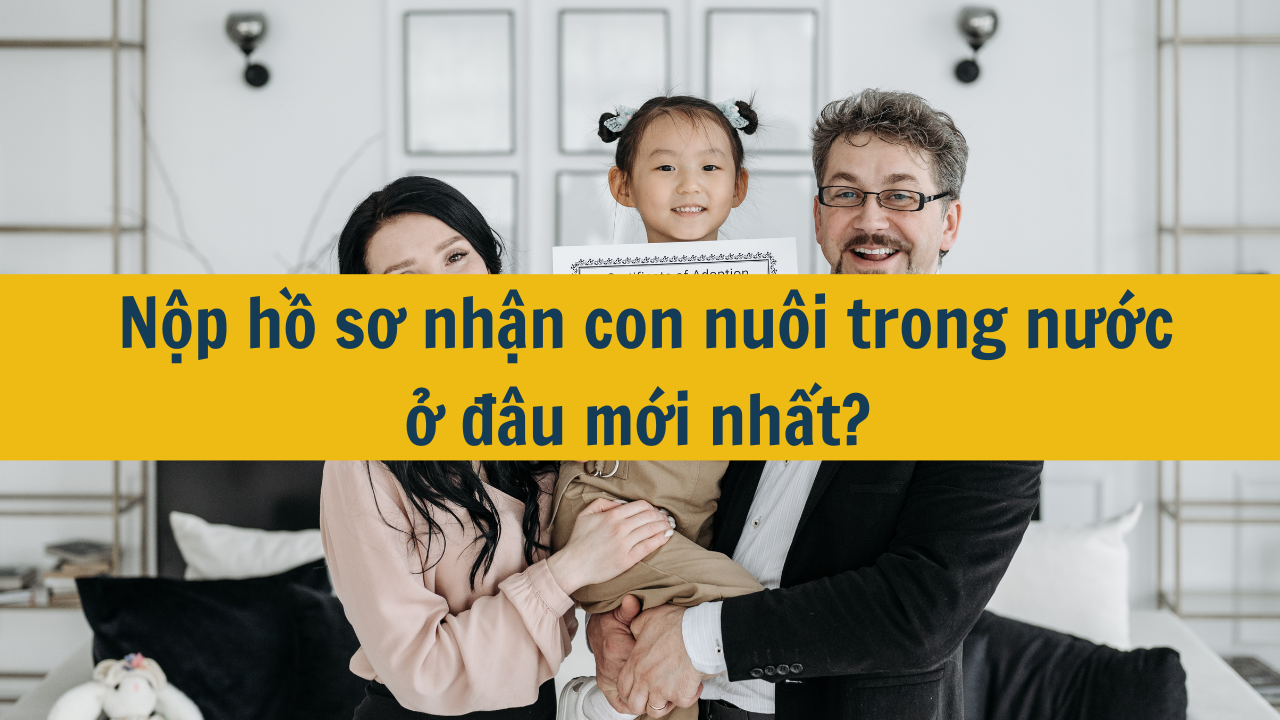
Nộp hồ sơ nhận con nuôi trong nước ở đâu mới nhất 2025?
iệc nhận con nuôi không chỉ là một quyết định quan trọng về mặt tình cảm, mà còn là một quá trình pháp lý cần tuân thủ nghiêm ngặt. Một trong những bước đầu tiên và quan trọng trong thủ tục nhận con nuôi là việc nộp hồ sơ đúng nơi quy định. Vậy nộp hồ sơ nhận con nuôi trong nước ở đâu? Đây là câu hỏi mà nhiều bậc phụ huynh có ý định nhận nuôi thường xuyên thắc mắc. 19/01/2025Nhận con nuôi từ bao nhiêu tuổi mới nhất 2025?

Nhận con nuôi từ bao nhiêu tuổi mới nhất 2025?
Nhận con nuôi là một quá trình mang tính nhân đạo cao, đồng thời yêu cầu tuân thủ nghiêm ngặt các quy định pháp luật nhằm bảo vệ quyền lợi của cả người nhận nuôi và trẻ được nhận nuôi. Theo các quy định mới nhất cập nhật năm 2025, độ tuổi tối thiểu để trẻ em được nhận làm con nuôi cũng như người nhận nuôi phải tuân theo các điều kiện cụ thể nhằm đảm bảo phù hợp với nhu cầu chăm sóc, nuôi dưỡng và phát triển. Bài viết dưới đây sẽ làm rõ độ tuổi cần thiết để nhận con nuôi, cùng các yếu tố pháp lý liên quan, giúp bạn hiểu rõ hơn về quy trình này. 27/12/2024Mẫu đơn xin nhận con nuôi trong nước mới nhất 2025
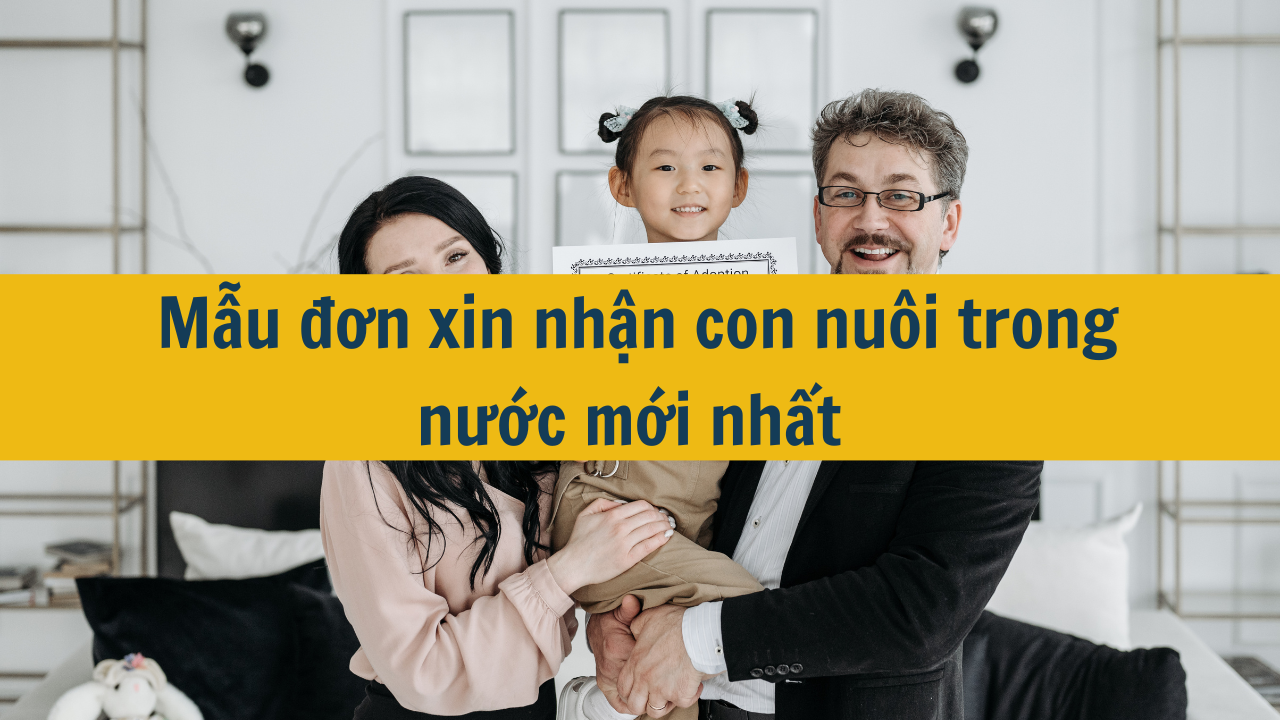
Mẫu đơn xin nhận con nuôi trong nước mới nhất 2025
Việc nhận con nuôi là một hành động đầy nhân văn, thể hiện sự quan tâm và yêu thương đối với những trẻ em thiếu thốn tình cảm gia đình. Để thực hiện thủ tục này tại Việt Nam, các cá nhân, gia đình cần tuân thủ đúng các quy định pháp lý, trong đó mẫu đơn xin nhận con nuôi đóng vai trò quan trọng. Bài viết này sẽ giới thiệu chi tiết về mẫu đơn xin nhận con nuôi trong nước mới nhất 2025, cùng các bước hướng dẫn điền đơn và các lưu ý cần thiết để quá trình nhận con nuôi diễn ra suôn sẻ. Những thông tin trong bài sẽ giúp các bậc phụ huynh hiểu rõ hơn về các thủ tục, cũng như những yêu cầu cần thiết trong việc xin nhận con nuôi theo quy định hiện hành. 19/01/2025Độc thân có được nhận con nuôi không mới nhất 2025?


 Luật nuôi con nuôi 2010 (Bản Word)
Luật nuôi con nuôi 2010 (Bản Word)
 Luật nuôi con nuôi 2010 (Bản Pdf)
Luật nuôi con nuôi 2010 (Bản Pdf)